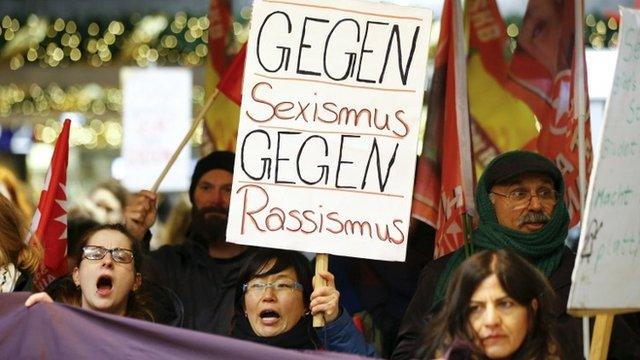Cologne sex attacks: Search for answers
- Published
One woman described how a firecracker put in her hood has left her scarred for life
A series of apparently co-ordinated sexual assaults and thefts in the German city of Cologne on New Year's Eve has inspired an outpouring of shock and anger.
Politicians scrambled to express their condemnation after it emerged that more than 100 women had complained of harassment and violence at the hands of gangs in the square outside Cologne's main railway station.
But there has been widespread criticism of the slow response by city authorities, amid accusations of an initial cover-up and controversy over the mayor's advice to young women following the attacks.
As reports of assaults continue to come in from Cologne and some other German cities, victims and onlookers have been asking how this could happen.

The area is notorious for crime
Residents in Cologne say the area around Cologne Cathedral is a well-known danger zone when it comes to pickpockets and theft.
The spot, in the centre of the city, attracts thousands of people for the New Year celebrations, and the combination of crowds, alcohol and fireworks has proved problematic for police for a number of years.
Many of the perpetrators on Thursday night reportedly used a well-known tactic to distract their victims by trying to dance with them.
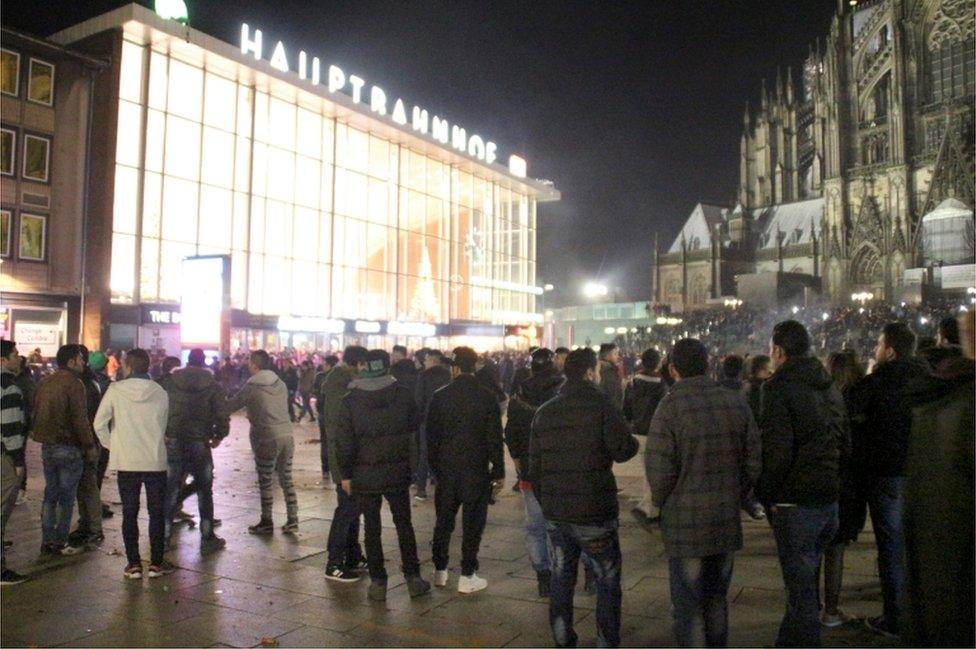
Large crowds of men gathered in front of the main railway station in Cologne on New Year's Eve
But authorities say the scale and nature of the latest wave of attacks, including allegations of rape and sexual assault, were "unprecedented".
About 1,000 young men - many of North African or Arab appearance - are believed to have arrived in large groups, seemingly with the specific intention of carrying out attacks on women.
The violence outside Cologne's main train station sparked a heated debate about Germany's open door policy on migrants.

Police were there but failed to stop attacks
Witnesses said police officers in Cologne appeared to be surprised and overwhelmed by the attacks.
Rainer Wendt, head of the German Police Union, said there were simply not enough officers deployed.
And internal national police report said officers simply "could not cope" with the volume of attacks. Women were "forced to run the gauntlet" through gangs of drunken and aggressive men, it said.
Cologne police chief Wolfgang Albers insisted police were well prepared, with 70 federal officers in the station, and about 140 Cologne police officers around the cathedral area and city centre.
But whatever the staffing numbers, it is clear officers on duty failed to stop the attacks.
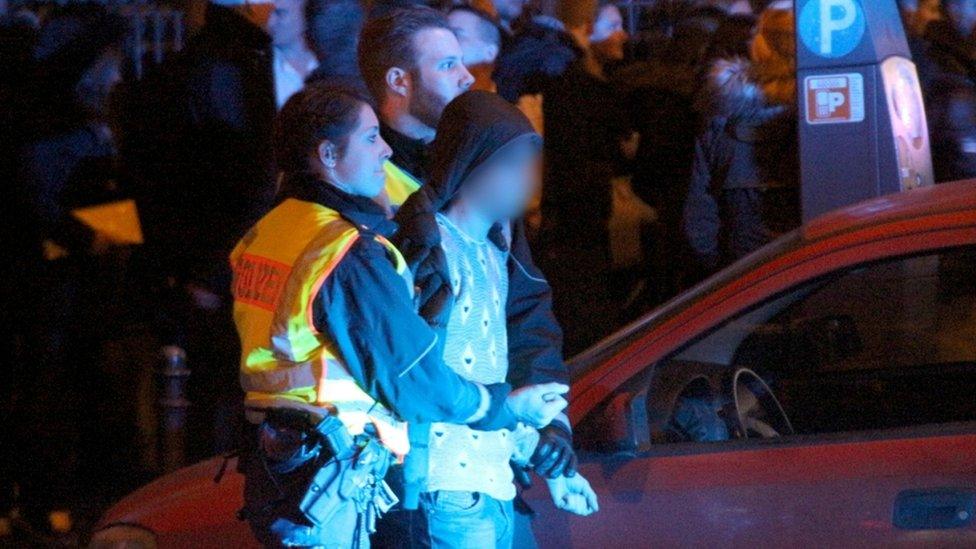
Police made arrests outside the station but failed to link suspects immediately to the sex attacks
Interior Minister Thomas de Maiziere accused police of waiting for complaints rather than taking preventative action.
Meanwhile Mr Albers was forced to say the initial police assessment - describing a "relaxed atmosphere" in the city on New Year's Eve - was incorrect.
And, a week after the incident, only a handful of arrests are thought to have been made despite reports of hundreds of men being involved.
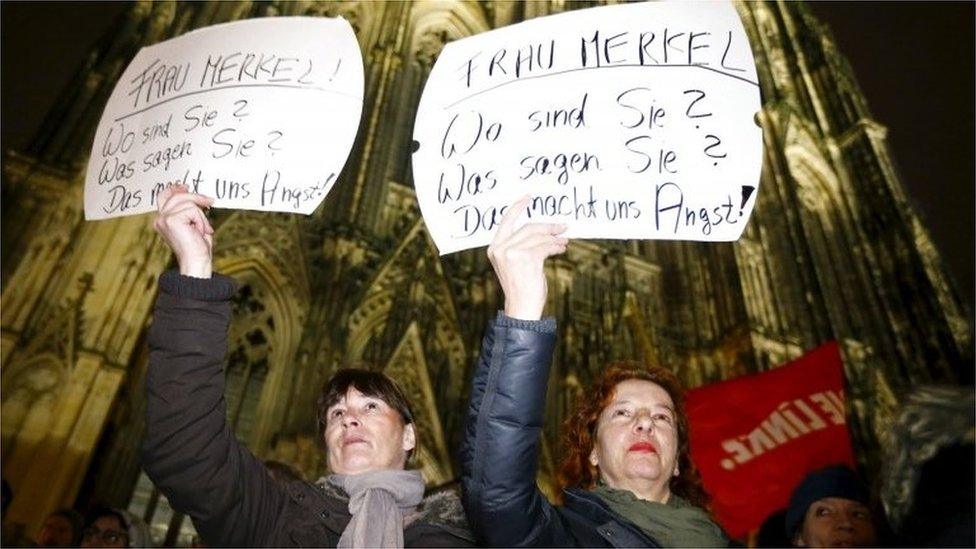
Protesters in Cologne wanted answers from the German chancellor
Irmgard Kopetzky from Cologne rape crisis centre told the BBC that more action was needed to provide more security for women.
"It is still being clarified how something like this could happen when the police already had so many personnel there," she said.
"Going forward it is vital that the police get more staff - something that has long been a requirement - and that attackers are prosecuted and punished."
Is there a taboo about the perpetrators?
Soon after reports emerged that the men involved were of Arab or North African appearance, anti-immigration campaigners seized on the incident as an example of Germany's failed asylum policy.
Some suggested Germany's media had been hesitant to report on the attacks for fear of stirring far-right sentiment, after the arrival of more than a million migrants and refugees in the past year.
Public broadcaster ZDF later apologised on social media because it failed to report on the mass assaults on its Monday evening news bulletin.
Female residents of Cologne speak out over the New Year's Eve assaults
Interior Minister Thomas de Maiziere stressed there should not be any general suspicion towards refugees.
"But if North Africans were the perpetrators, for which there is some indication, there should not be a taboo and people should not gloss over it."
Cologne Mayor Henriette Reker said "people from other cultures" needed to be given "a better explanation" about appropriate behaviour during street celebrations.
Meanwhile experts stress that sexual violence is an issue for people of all ethnic origins.
Figures show the majority of people carrying out sex attacks in Germany do not come from an immigrant background. In two-thirds of cases, the perpetrator is known to the victim, Ms Kopetzky says., external
Attitudes need to change
Following the Cologne attacks, Mayor Reker was criticised for urging young women and girls to adopt a code of conduct that meant keeping an "arm's length" distance from strangers.
Justice Minister Heiko Maas wrote on Twitter, external: "It is not women who bear responsibility, but the perpetrators."
As well as the incident in Cologne, women were targeted in Hamburg and Stuttgart.
Ms Kopetzky from Cologne rape crisis centre said there was a clear need more public awareness of sexual harassment and assault across the country.
"Women's groups like ours have been doing what we can for many years, but many people only recognise the subject when they are affected personally," she said.
Meanwhile Barbara Steffens, equality minister in North Rhine-Westphalia, told the BBC there needed to be greater recognition of the issues women faced on a daily basis, as well as more "social condemnation of male abuse of power".
"It is still the case that women who have been raped are often not believed, abuses are trivialised, lewd jokes and sexist comments are tolerated, and women are reduced to their bodies," she said.
"We need to work on that, to create a tangible culture of respect."
- Published6 January 2016
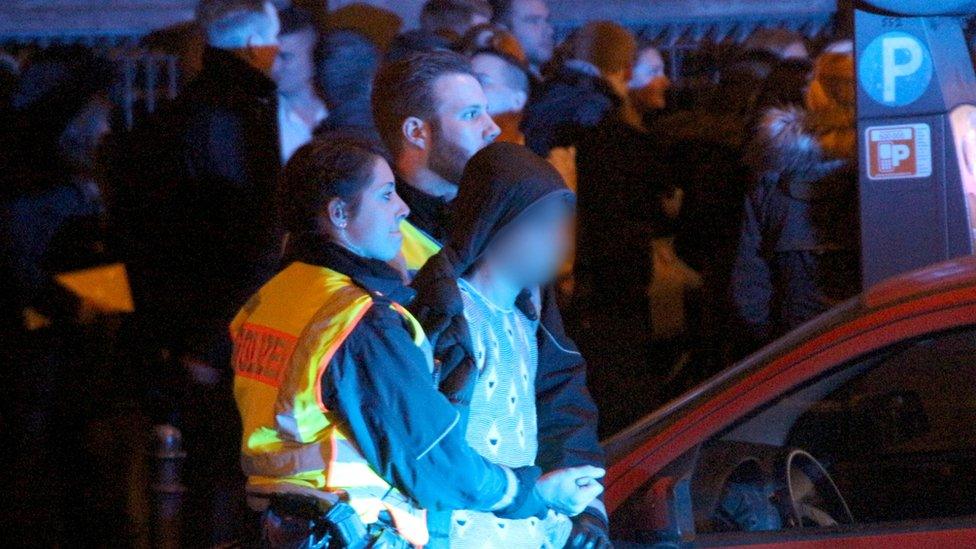
- Published6 January 2016

- Published5 January 2016
